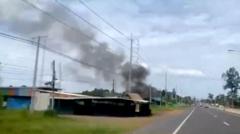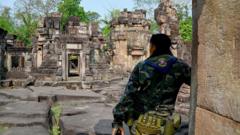The recent border skirmish between Thailand and Cambodia, ignited by past grievances and diplomatic blunders, raises concerns of a larger conflict as both nations grapple with internal and external pressures.**
Rising Tensions: The Thailand-Cambodia Border Conflict Explained**

Rising Tensions: The Thailand-Cambodia Border Conflict Explained**
A deeper look into the renewed clashes between Thailand and Cambodia stemming from personal and political betrayals.**
In a dramatic escalation of tensions, the border conflict between Thailand and Cambodia has reignited, resulting in casualties and a palpable atmosphere of hostility. Occurring on Friday, this latest outburst of violence comes in the wake of longstanding disputes over territory that have plagued the two Southeast Asian nations for years. Their shared border, characterized by dense forests and contested regions, has seen flare-ups before, dating back to 2008 and 2011, which resulted in numerous fatalities, but this latest incident appears more alarming.
Initially triggered by an explosive landmine that injured Thai soldiers, civilian casualties quickly mounted, with reports indicating at least 15 dead in Thailand, plus tragic losses on the Cambodian side. Keeping the peace had seemed possible just months ago, with both nations' military leaders engaging in dialogues aimed at resolving their differences. Yet, amid this backdrop, a personal fracture between key leaders has added fuel to the fire.
The already tense relations took a considerable downturn last month when a private phone conversation between Thai Prime Minister Paetongtarn Shinawatra and Cambodian leader Hun Sen was leaked. The conversation reportedly featured Paetongtarn addressing Hun Sen as "uncle," a term of familial respect that was viewed as damaging, leading to public outcry against her leadership. Consequently, she has been suspended, and her political future hangs in the balance.
The turning point is steeped in historical ties; the two leaders’ families have maintained a close relationship for decades, further complicating the current diplomatic environment. Yet, Hun Sen's unexpected leak has left many, including members of the Shinawatra family, feeling betrayed. As discussions turn to accusations, public discourse has intensified, with both nations’ political spheres falling victim to a growing rhetoric of animosity.
While investigations into illicit activities linking Cambodian businessmen to gambling operations are underway in Thailand, regional economics hang precariously. Trade worth billions has come to a halt, stifling both economies, already burdened by a sluggish post-pandemic recovery.
The younger generation of leadership in Cambodia, represented by Hun Sen's son, Hun Manet, struggles with established adversaries, while back in Thailand, government stability is compromised due to ongoing economic challenges and the pressures of international relations.
On both sides, an unwillingness to back down prevails. The expulsion of the Cambodian ambassador by Thailand further illustrates the deteriorating situation that may force both countries to confront their ties directly. As experts call for intervention from ASEAN to de-escalate tensions, the future remains uncertain.
Ultimately, both nations face a significant dilemma: how to navigate personal vendettas amidst the intricate web of regional politics. Unpacking Hun Sen’s motivations for reigniting this conflict reveals deeper truths about the shifting dynamics between two neighboring nations, possibly foreshadowing a complicated journey toward reconciliation.
Initially triggered by an explosive landmine that injured Thai soldiers, civilian casualties quickly mounted, with reports indicating at least 15 dead in Thailand, plus tragic losses on the Cambodian side. Keeping the peace had seemed possible just months ago, with both nations' military leaders engaging in dialogues aimed at resolving their differences. Yet, amid this backdrop, a personal fracture between key leaders has added fuel to the fire.
The already tense relations took a considerable downturn last month when a private phone conversation between Thai Prime Minister Paetongtarn Shinawatra and Cambodian leader Hun Sen was leaked. The conversation reportedly featured Paetongtarn addressing Hun Sen as "uncle," a term of familial respect that was viewed as damaging, leading to public outcry against her leadership. Consequently, she has been suspended, and her political future hangs in the balance.
The turning point is steeped in historical ties; the two leaders’ families have maintained a close relationship for decades, further complicating the current diplomatic environment. Yet, Hun Sen's unexpected leak has left many, including members of the Shinawatra family, feeling betrayed. As discussions turn to accusations, public discourse has intensified, with both nations’ political spheres falling victim to a growing rhetoric of animosity.
While investigations into illicit activities linking Cambodian businessmen to gambling operations are underway in Thailand, regional economics hang precariously. Trade worth billions has come to a halt, stifling both economies, already burdened by a sluggish post-pandemic recovery.
The younger generation of leadership in Cambodia, represented by Hun Sen's son, Hun Manet, struggles with established adversaries, while back in Thailand, government stability is compromised due to ongoing economic challenges and the pressures of international relations.
On both sides, an unwillingness to back down prevails. The expulsion of the Cambodian ambassador by Thailand further illustrates the deteriorating situation that may force both countries to confront their ties directly. As experts call for intervention from ASEAN to de-escalate tensions, the future remains uncertain.
Ultimately, both nations face a significant dilemma: how to navigate personal vendettas amidst the intricate web of regional politics. Unpacking Hun Sen’s motivations for reigniting this conflict reveals deeper truths about the shifting dynamics between two neighboring nations, possibly foreshadowing a complicated journey toward reconciliation.


















